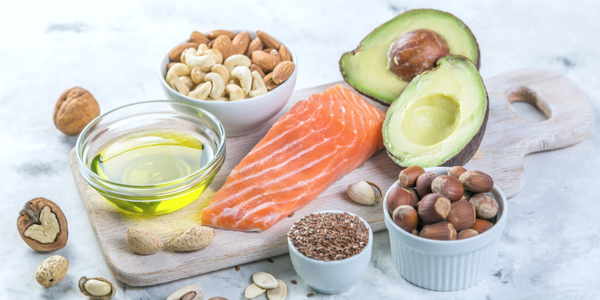
Going "keto" is one of the most popular trends in the diet world. Dieters often take to keto in hopes to lose weight and gain a number of health benefits.
While the diet can be safe and successful for some, is keto good for gut health? Learn the potential impacts keto has on gut bacteria, digestion, and more.
Keto Recap
Informally known as keto, the ketogenic diet is a very low-carb, high-fat diet. The drastic reduction of carbs puts the body into a metabolic state known as ketosis. Altering into the state of ketosis mostly limits access to sugar glucose. With glucose absent in the bloodstream, insulin release is dramatically reduced.
Instead, body fat releases and transfers fatty acids to the liver. This is where they are converted into ketones and used as the primary fuel. The conversion of fatty acids to ketones is critical. Fatty acids are unable to cross the blood-brain barrier and provide energy to the brain, whereas ketones can.
Uses of a Keto Diet
The keto diet has a long history, as it was created in 1924 to reduce seizes in the pediatric population. Fast forward to 2006, health experts and dietitians identified its use in pediatric patients unresponsive to anti-seizure medications.
Keto continues to gain momentum in the health world related to its potential health benefits. These include weight loss, blood sugar control, and reduced inflammation. The benefits, in turn, are hoped to lower the risks of heart disease, type 2 diabetes, and other health conditions.
However, health experts caution going keto may impact gut health in a number of ways.
Keto and Gut Health
Gut health essentially refers to a balance of microorganisms that live in the digestive tract. The balance of bacteria, viruses, and yeasts helps maintain overall good health.
Diet is one of the most influential components of a healthy gut. So, how does keto impact digestive and gut health?
1. Keto Diet and Fiber Intake
A keto diet uses a ketogenic ratio of up to 4 grams of fat per 1 gram of carb and protein. This translates to about 75 to 80 percent of daily calories coming from fat and 50 grams or less of carbs. With an increased need for fat, there is heavy use of whipping cream, butter, mayonnaise, oils, and high-fat meats.
In this eating pattern, notice the absence of whole grains, fruits, veggies, and legumes. These whole foods are rich in dietary fiber, a non-digestible plant component.
Dietary fiber helps increase and soften stools, thus keeping bowel movements regular. A high-fiber diet may likewise reduce the development of hemorrhoids and diseases of the colon, including colorectal cancer.
Men and women are recommended to consume 38 and 25 grams of fiber daily, respectively. Limiting wholesome carbs might negotiate fiber intake, in turn negatively impacting a healthy gut.
2. Keto and Gut Inflammation
Lowering the intake of whole plant foods can reduce beneficial nutrients beyond fiber. Plants are also rich in phytochemicals, which are beneficial compounds found in plants.
Phytochemicals have anti-inflammatory properties. This is of benefit as chronic inflammation may contribute to inflammatory disorders like Crohn's disease and ulcerative colitis.
These plant compounds often function as antioxidants, too. Antioxidants defend and inhibit the process of oxidation that can produce harmful free radicals. Ultimately, antioxidants help protect against cell damage and chronic diseases.
On the contrary, though, a keto diet naturally limits processed, carb-rich foods that can be pro-inflammatory.
3. Keto Diet and Gut Bacteria/Microbiome
The human microbiome is composed of bacteria, archaea, viruses, and microbes that reside both in and on the body. Housed gut bacteria have a tremendous impact on health, primarily by boosting the immune system and fighting against harmful, foreign invaders. But when it comes to the microbiota of the gut, it is quite diverse compared to other body sites.
Microbiota is an integral component of digestion and nutrition and has shown to offer beneficial interactions with the immune system. There are also emerging findings on their relationships with chronic diseases, including heart disease, colorectal cancer, obesity, and diabetes.
The gut microbiome can be impacted by diet and a high-fat diet is linked to unfavorable gut microbiome changes. The researchers found higher-fat diet was linked to changes in long-chain fatty acid metabolism. This resulted in higher levels of chemicals that may trigger an inflammatory response.
Conversely, newer research suggests the ketogenic diet positively alters the gut microbiome. While an animal study, researchers found ketone bodies impact the gut microbiome in ways that may ultimately suppress inflammation. This suggests the potential benefits of ketone bodies as a therapy for autoimmune disorders affecting the gut.
4. Keto Diet and Acid Reflux
Gastroesophageal reflux disease (GERD) is a condition in which potent stomach acid is refluxed into the delicate lining of the esophagus. Frequent and ongoing irritation can cause many side effects of GERD, including tooth decay, esophagitis, Barrett's esophagus, and esophageal cancer.
The worry of keto and GERD is that high-fat foods can worsen GERD and acid reflux symptoms and cause irritation. If symptoms worsen following a high-fat diet, it is advised to stop eating them until symptoms improve. Avoiding them altogether may be recommended as well.
So, Can You Go Keto for a Healthy Gut?
Research is mixed on how a keto diet impacts gut health and recommendations vary based on individual needs and preferences. Experts do suggest gut health is often positively influenced by:
• Increasing pre- and probiotics to help control beneficial gut bacteria. Keto-friendly sources of the two include full-fat yogurt and cheese, kimchi, sauerkraut, and asparagus.
• Staying hydrated, as water helps absorb and digest nutrients obtained from food and promotes bowel regularity.
• Moderating alcohol to lower initial dehydration and digestive distress risk and the long-term risks of imbalanced gut flora.
• Exercising regularly to promote bowel regularity. Evidence suggests exercise can impact gut health and its integrity as well.
• Managing stress, as stress can either cause digestive processes to slow down or become heightened. Changes in these processes can cause constipation or bowel urgency related to the respective digestive response.
Overall, following a ketogenic diet can be safe though going keto is similar to all diets - their success vastly depends if they can be followed long-term. Critics of keto suggest following the diet requires strict adherence. There really is no sort of forgiveness, as straying from the eating pattern can reverse the metabolic pathway of ketosis.
Unlike the ketogenic diet that requires strict guidelines, bistroMD's Keto Flex program offers flexibility to best fit your health goals and lifestyle! Utilizing fresh ingredients, each meal is nutritionally adequate to optimize gut and overall health.
BistroMD offers a custom menu and over 200 nutritious and delicious recipes. So truly, feeling deprived is out of the question with so many flavorful food options!







